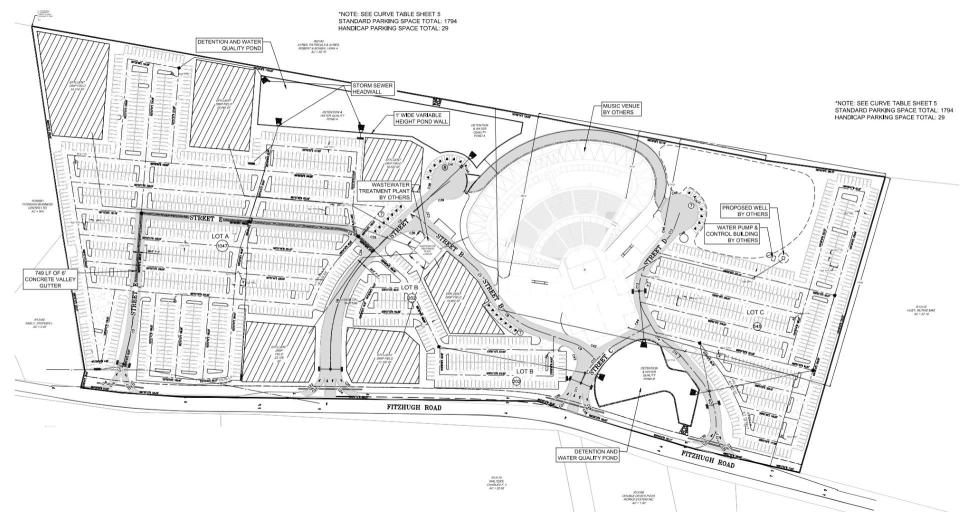Neighbors angrily reject proposed 5,000-seat amphitheater due to environmental concerns
A proposal for a 5,000-seat amphitheater on a 32-acre tract of land on Fitzhugh Road has drawn significant ire from neighbors who would share a single-lane road with concertgoers in their rural neighborhood southwest of Austin.
At a Monday night meeting requested by state Sen. Donna Campbell, a Texas Commission on Environmental Quality panel heard two hours’ worth of testimony and questions from opponents of the development. The TCEQ has drafted a wastewater permit for the development, though public outcry and legal challenges could shape its outcome.

As currently drafted, the permit would allow the daily disposal of 12,000 gallons of wastewater through a subsurface irrigation system. Fitzhugh neighbors have armed themselves with a coalition and retained substantial legal counsel, a sign of their general affluent background and ability to fight back against a large-scale real estate developer they say could endanger nearly 30,000 acres of land.
The panel said it would take public comments into account and would consider neighbors’ appeals. It did not give a timeline for the permit’s approval or rejection, nor was a timeline provided for construction of the amphitheater should the permit be approved.
According to the coalition of residents, the event venue would draw crowds, vehicles and waste to an enclave that values its connection with nature. Aquifer-fed springs bubble up at several properties along Fitzhugh Road, and some protesting homeowners are concerned the development would distress an already fragile ecosystem; threaten the golden-cheeked warbler, an endangered bird; and cause irreversible soil erosion, among other issues.
“There is no doubt that it would have an extremely negative effect on the ecosystem from a biodiversity, noise, light, water quality perspective. Open space is quickly disappearing in the Austin area,” Bradford Wilcox, a professor of ecohydrology at Texas A&M University, told the American-Statesman in an email.
Mike Clifford, a director at the Greater Edwards Aquifer Alliance, said that if Blizexas LLC, the California-based property developer, “does not sell the land or settle with local landowners, then the fate of the Fitzhugh Amphitheater will be decided by the courts.”
Clifford spoke tenaciously at the meeting, expressing concerns that the permit, if granted, would be among the laxest ever approved by the TCEQ. The permit would not require the removal of nitrogen or phosphorus, which can cause lethal algae blooms, and it would have limited requirements for E. coli testing. He said the pollution limits set by the TCEQ are four times what they should be for a 30-acre development.
He told the Statesman that the aquifer alliance has worked to block or negotiate settlements on similar developments in the past. A heavily contested plan for a 20,000-seat Violet Crown Amphitheater, near Bee Cave, has been stalled since 2022, while Honey Creek Ranch near Bulverde, previously at risk of being turned into a housing development, was sold to the Texas Parks and Wildlife Department for $25 million, and it will be part of the Honey Creek State Natural Area.
Carrie Napiorkowski, a member of the Fitzhugh Neighbors coalition, said Blizexas’ proposed amphitheater threatened her Polish immigrant husband’s American dream. Their 13 acres on Fitzhugh’s winding road has eight karst features in the form of natural springs, which could be contaminated by runoff from the amphitheater, making their well water dangerous.
“This dream is being taken away by the selfish desire of a developer who doesn’t understand the sensitive ecosystem in our area,” she said.
Another member of the coalition said she resides downhill from the proposed development. Sue Munn worries the pollution could infect Barton Creek and springs connected to the Trinity aquifer, located near her property. Should the amphitheater be developed, she noted that her 3-year-old grandson might no longer be able to play in the creek, and that the pollution of Barton Creek at large “would be everyone’s problem.”
While speaking to the panel, Brian Zabcik, an advocacy director at Save Barton Creek Association, noted that should the permit be approved, it would be the first wastewater permit of that magnitude on Barton Creek.
“The threshold for approving it must be very, very high,” Zabcik told the TCEQ panel.
This article originally appeared on Austin American-Statesman: Austin ecosystem at risk over proposed 5,000-seat venue, residents say

